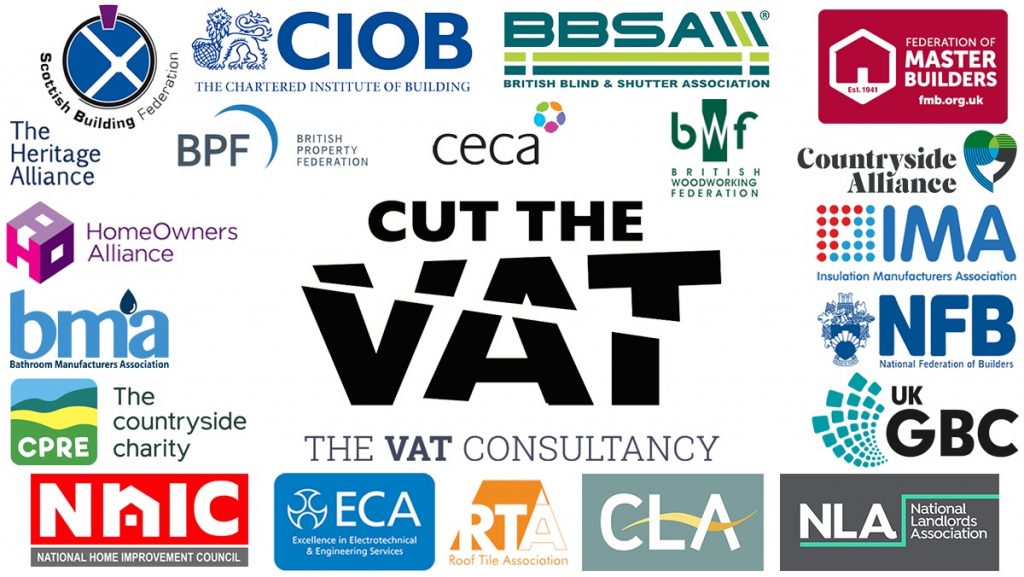The BWF are one of many organisations that have come together to support the call for a 5% rate of VAT on repairs, maintenance and management of homes. The campaign led by the British Property Federation and the Federation of Master Builders yesterday called on the main party leaders to commit to a reduction in the rate of VAT from 20% to 5%.
Reducing the rate of VAT on all repairs, maintenance and management of residential property would have positive impacts on vast number of different areas of society, by greening our housing stock, addressing the housing crisis through helping the Built to Rent sector and tackling the cash-in-hand economy by removing its competitive advantage.

The built environment accounts for approximately 40%1 of the UK’s carbon emissions – and therefore has a crucial part to play in meeting our net zero emissions targets by 2050. Given the rate of renewal of the built environment, the UK Green Building Council estimates that 80%[1] of the buildings that will exist in 2050 have already been built, so decarbonising and improving the energy efficiency of our existing stock must be a high priority. To fully decarbonise the built environment both the operational carbon and embodied carbon in buildings must be tackled, retrofitting provides an opportunity to achieve significant embodied carbon savings through re-use rather than re-build.
Domestic buildings are accountable for about half of these emissions. The UK has some of the most energy inefficient housing stock in Europe, which will need radically upgrading if we are to reach our target of net zero by 2050. There are 8 million lofts that need insulating, 5 million uninsulated cavity walls, and 20 million uninsulated floors[2]. Homeowners will need to be incentivised to undertake these home improvement works, and reducing the VAT burden associated with repairs and maintenance would be a clear way of stimulating demand.
In order to address the housing shortage in this country, the next government will need to support investment in all forms and all tenures of housing which meet the needs of our communities at all stages of our lives. In addition to improving the standards of older homes and those in rural areas, this measure would also help unleash investment in new housing. Build to Rent (BTR) is a relatively new asset class in the UK which provides high quality, purpose built rental housing, which is professionally managed. The BTR sector has grown from fewer than 30,000 homes to 148,000[3] homes in the last five years – and delivered a quarter of London’s housing output last year. With fiscal reform this sector can deliver more.
The recoverability of VAT on construction costs is inordinately complex – with different costs recoverable depending on who the occupier is, whether the property is commercial or residential, and whether the property has been built for sale or for rent. In summary though, it is generally easier to recover VAT on expenditure incurred on commercial property than it is on homes. This makes large-scale investment in homes comparatively less attractive. Reducing the rate of VAT on repairs, maintenance and management on homes would help level the playing field in terms of VAT recovery for investors in different types of property.
The suggestion of reducing the rate of VAT on repairs and maintenance of homes has been advocated for by a number of stakeholders for some time. Most notably, the Cut the VAT campaign, which was formed by a coalition of over 60 business and trade bodies, lobbied exclusively on this issue several years ago. Cut the VAT commissioned some research[4] by Experian in 2015 to quantify the impact of reducing the rate of VAT on residential repairs and maintenance from 20% to 5% (over the 5-year period from 2015 to 2020). The measure itself was estimated to generate an economic stimulus of £15bn over the 5-year period to 2020 at a cost of £6.6bn over the same period. Some of the notable benefits of the policy include:
A more recent poll conducted by the HomeOwners Alliance, Resi architects and YouGov found that almost a quarter of people are put off from undertaking home improvements due to cost[5], and almost a third confessed to paying cash to avoid VAT on home improvements. These findings support Experian’s estimates that such a policy change would result in a surge of demand for home improvements and boost economic activity – and more importantly, boost standards by reducing the competitive advantage of the informal ‘cash in hand’ economy.
[1] https://www.ukgbc.org/climate-change/
[2] https://publications.parliament.uk/pa/cm201719/cmselect/cmbeis/1730/173004.htm
[3] https://www.bpf.org.uk/what-we-do/bpf-build-rent-map-uk
[4] Cut the VAT campaign research by Experian: https://www.fmb.org.uk/about-the-fmb/policy-and-public-affairs/domestic-refurbishment-and-energy-efficiency/